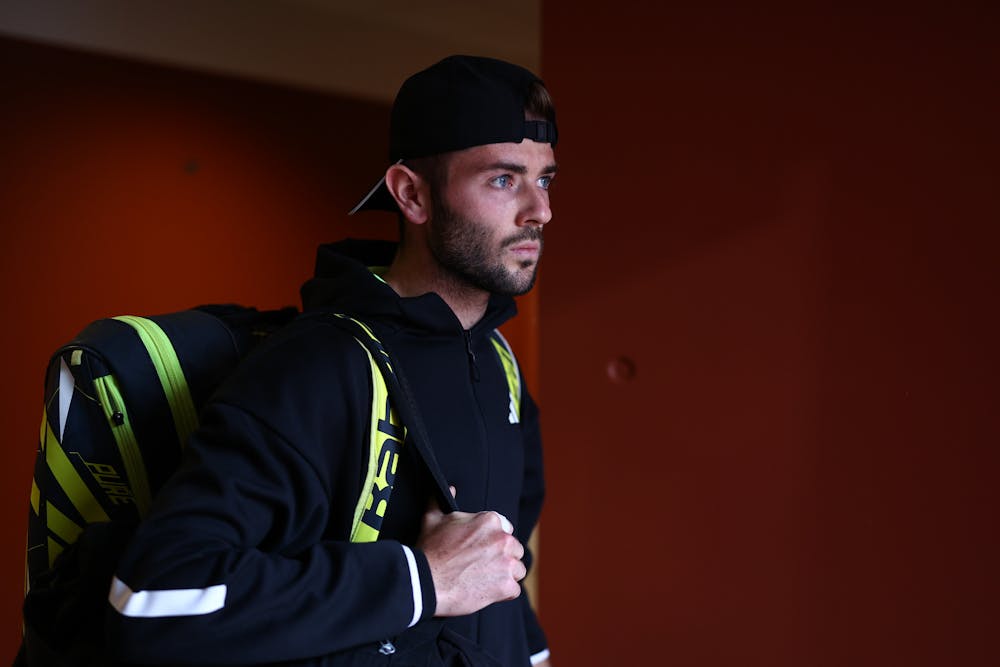This time two years ago, American Ethan Quinn was finishing off a stellar freshman season at the University of Georgia, becoming just the fourth first-year male player in history to win an individual championship in men’s tennis.
Fast learners among tennis’ ex-college stars
The US college system is producing a steady stream of young stars
 ©André Ferreira / FFT
©André Ferreira / FFTThe road to the top of the ATP tour has been longer than Quinn may have liked – “I thought I was going to come on tour and explode, like Ben Shelton did,” he candidly told The Athletic earlier this year – but here at Roland-Garros, it’s been obvious that this 21-year-old is a fast learner.
One of five former college tennis players into the third round in men’s singles, the 106th-ranked Quinn won three matches in qualifying to advance to the main draw in his Roland-Garros debut. He built on the good fortune he received when Grigor Dimitrov retired against him in the first round by hitting 92 winners to outlast lucky loser Alexander Shevchenko of Kazakhstan. It was his first career five-setter, which he won 6-4, 4-6, 6-7(6), 7-6(3), 7-5 – a four-hour and 14-minute lung-buster that Quinn dubbed “more physical than anything I could have imagined.”
 ©Cédric Lecocq / FFT
©Cédric Lecocq / FFTEthan Quinn
The seeds for such an effort, Quinn says, were planted not just in 17 clay-court matches in Europe this spring, but in his time as a co-ed: in that come-from-behind NCAA championship win on a sweltering day in Orlando, Florida, and on jam-packed days just north in Athens, Georgia, where he and his teammates’ daily schedules included not just a full slate of classes, but individual training blocks, team practices and strength-and-conditioning sessions in the gym. The system put in place by legendary head coach Manny Diaz, who also coached former Top 10 player John Isner at the school, equipped Quinn with the tools he needed to take his tennis to the next level.
“I felt every single day that I stepped out for practice that I was going to get better,” he said. “My first season, I had say 10 guys on the team who were better than me, helping me, pushing me to get better. We had a physio, a strength and conditioning coach, who were really helping me get stronger, making sure my mobility was getting better. There were a lot of key aspects that were helping me get better, even off the court. It was so professional.”
Once seen as a pathway for players who might not have all the chops for the professional tour – with major champions like Arthur Ashe and John McEnroe the exception rather than the rule – college tennis has blossomed into a legitimate training ground in both the men’s and women’s game. Danielle Collins, Ben Shelton and Emma Navarro, like Quinn, are all NCAA champions, and the youngest of those says that collegiate competition didn’t only just prepare his forehand and fitness for the rigours of the tour.
“If I was playing a French guy here, I’m sure I’d be getting trash talked; if I played an Italian in Rome, the same. There are certain matches that you’ll have to experience that and college tennis gets you tough,” Quinn said, a position Shelton endorsed. “I remember my first college match; I walked off losing the first set and these kids follow me into the bathroom and tell me these terrible things about my mother. It really gets you tough, that you have to go and play tennis matches in that.”
 ©Julien Crosnier / FFT
©Julien Crosnier / FFTBen Shelton
While Quinn and Shelton can commiserate on the behaviour of unruly fans, two players who competed at the same school will also face off for a place in the last 16. Cameron Norrie, 29, and Jacob Fearnley, 23 (pictured), “never crossed paths” according to the latter during their respective four years at Texas Christian University in Fort Worth, but the younger of the two Brits treats former Top 10 player Norrie as “an inspiration.” Ranked outside the world's Top 500 12 months ago, Fearnley never played a professional match on clay before this year, but will crack at least the Top 50 on the back of two wins in Paris.
“I think the big thing was that it was possible,” Fearnley says. “I think, to see a guy going to obviously the college that I went to, seeing how well he did coming out of college, it was more just inspiring. [It] showed me that it was possible, that the coaches at TCU and the work that he put in at TCU could kind of get him to the tour.
“I think he's done amazing things on the tour. He competes so hard, fights every match, fights every point. You can see that he really leaves it all out there. So that's something that I admire.”
 ROLAND-GARROS
18 May - 7 June 2026
ROLAND-GARROS
18 May - 7 June 2026

